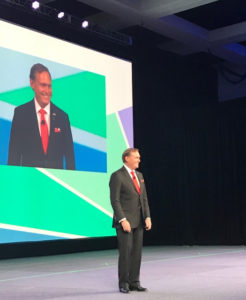“To be leaders in health care, anesthesiologists must develop their leadership skills inside and outside of medicine,” said ASA Past President John M. Zerwas, M.D., at Monday’s Emery A. Rovenstine Memorial Lecture.
In his inspirational presentation “Mentoring the Next Generation of Leaders,” Dr. Zerwas, who is serving his sixth legislative term in the Texas House of Representatives, encouraged anesthesiologists to develop their leadership skills at a grassroots level by seeking opportunities to mentor the next generation and propel the field of anesthesiology forward within health care and their individual careers.

John M. Zerwas, M.D., presented the Emery A. Rovenstine Memorial Lecture.
“I would not be here were it not for the mentorship of many other people,” Dr. Zerwas said.
Using the power of example, Dr. Zerwas cited inspirational mentors throughout history, starting with Emery A. Rovenstine, M.D., who himself mentored a long list of notable anesthesiologists, such as Gertie Marx, M.D., and Stuart Cullen, M.D. Other recent leading mentors in the field of anesthesiology include Mark Lema, M.D., Ph.D., Jeff Apfelbaum, M.D., and Roger Moore, M.D. They devoted much of their lives to guiding ASA through crisis periods, Dr. Zerwas said. Two people who mentored those inspiring ASA past presidents include Gene Sinclair, M.D., and Barbara Fossum, Ph.D.
“Gene’s incredible discipline for management created for us the premiere medical society in the U.S., if not the world, that the ASA is today,” Dr. Zerwas said. “Barbara is unassuming, but she’s a fantastic executive. She knows how to coach and mentor people.”
Dr. Zerwas highlighted Abraham Lincoln, whose mentor John Stuart encouraged him to pursue a legal career, and Eugene Kranz, an aerospace engineer and NASA flight director who famously declared, “Houston, we’ve got a problem,” regarding the ill-fated Apollo 13 mission.
Kranz called on his mentor, Chris Kraft, in his darkest hour who taught Kranz about risk, Dr. Zerwas said. The attributes of great mentors include character, communication, courage, encouragement, example, accountability, professionalism and perseverance. Successful mentorship also takes trust.
“People who have the ability to be seen as trustworthy are incredible mentors,” Dr. Zerwas said.
Still, there are countless opportunities to kill that trust in our daily interactions. Mentorship is a two-way street. In working with young people Dr. Zerwas mentors within the Texas Legislature, he admitted he could improve his communication skills. To further gain their trust and confidence, “I need to listen more,” he said.
Although all leaders have had great mentors, not all leaders are great mentors, Dr. Zerwas noted. He cited Vince Lombardi, the successful head coach for the Green Bay Packers from 1959 to 1967. Lombardi was the result of great leadership early in his life. But there were not a lot of great football coaches who resulted from Lombardi’s tutelage.
“Regardless of where we are in our leadership journey, there will always be mentoring opportunities, whether molded out of crisis or the daily engagement,” Dr. Zerwas said. “It’s absolutely essential that we look to mentorship as a critical part of what we do.”
Return to Archive Index